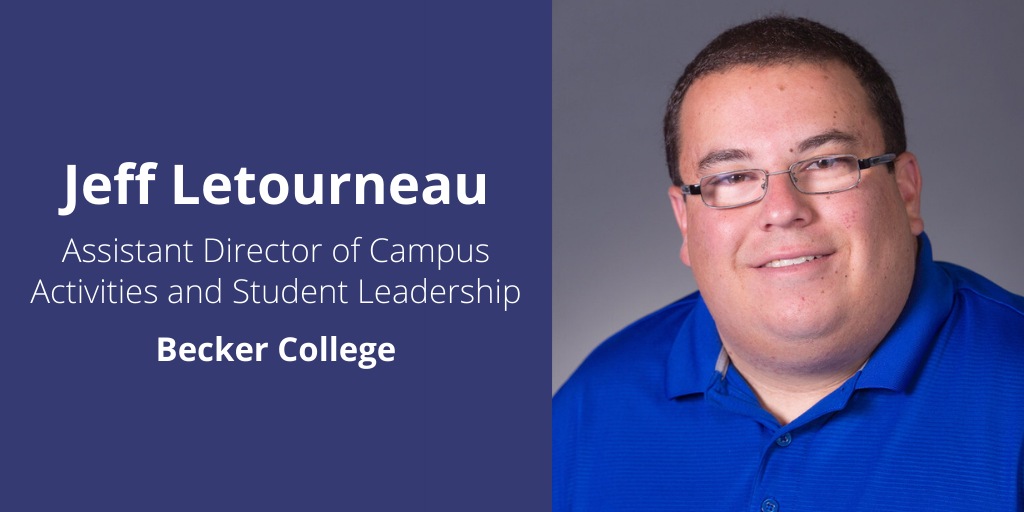A diligent advisor is a crucial, yet often underappreciated, part of a student government association.
No matter the SGA size or age, at one point or another, the student leaders will seek their advisor’s help in addressing conflict, planning large events, and navigating the campus administration.
And now, with many campuses operating remotely, advising student governments has gotten even more complicated.
So, I consulted Jeff Letourneau, the Assistant Director of Campus Activities and Student Leadership at Becker College, a private institution in central Massachusetts. We discussed his experience advising their Student Government Advisory Board (SGAB), helping student leaders address conflicts and concerns, and building community — all while operating 100% remotely.

To say Jeff loves student government would be an understatement.
Jeff is a proud alumnus of Assumption University, where he discovered his love of student affairs through serving as class president for three years and student body president for one year.
Jeff has been advising Becker’s SGAB for three years. He believes that it’s imperative for students to realize they have a voice on campus; faculty and staff truly want to hear their voices!
Here are Jeff’s top five tips for other student government advisors working remotely.
5 Tips
1. Less is more
Given that students are having to balance their classes, work, and family commitments all at once, Jeff has found that meeting less often allows for more productive meetings. It’s much better than working with disinterested, Zoom-fatigued students!
- Don’t meet just to meet. Over-meeting will add to the burnout your senators are already feeling from having classes and other activities over video calls.
- Ask students how often they think it’s appropriate to meet. With events and initiatives likely slowed due to the pandemic, your senators may prefer to spread out their organization-wide meetings.
- Prepare a meeting agenda and stick to it! This will enhance the productivity of your meetings and make sure that you discuss what needs to be discussed.
For more tips on making your meetings more productive and goal-focused, check out 10 ways to eliminate or reduce time wasted in unnecessary meetings.
2. Strategize your one-on-one meetings
Prior to the pandemic, Jeff met with all of his senators one-on-one once a week. Now, he only meets every other week with the president and as needed with each senator. Like the first tip, this tactic is all about holding meetings only when they’re necessary, not frivolous.
To make the most of your one-on-ones, you should:
- Set clear expectations ahead of time regarding the meeting’s agenda, expectations, and mood.
- Allow time to build relationships with each student. Check out this list of virtual icebreaker questions you can ask in your one-on-ones.
You might also appreciate Our Top 7 Tips for Conducting Stellar One-on-One Meetings with Student Staff.
3. Plan way ahead
You can’t rely on stopping by someone’s office for a quick question or a casual conversation while working remotely. Every conversation needs to be scheduled.
- Schedule meetings with campus partners to discuss initiatives and events early.
- Assign a senator for each initiative to be responsible for. This student will need to make sure that vital pieces of projects are completed accurately and on time. Such assignments will help you avoid the bystander effect and last-minute scrambling.
- Set boundaries on communication. Establish etiquette for your senators to email you questions and discuss appropriate timeframes for requests.
By setting these guidelines, you’ll set your student government up for success in partnering with other campus organizations and offices, hopefully minimizing hiccups along the way.
4. Reconsider your role
Before the pandemic, you may have taken it for granted that you’d get to have daily interactions with students in your office, dining hall, and other spots around campus. But now meetings may feel more transactional as they lose the in-person touch.
You can address this barrier through these strategies:
- Set time aside for check-ins at the start and end of meetings.
- Follow up with students who express that they are struggling with their SGA roles or personal lives or who simply want to catch up with you.
- Share campus resources that students may not realize are accessible virtually, such as career coaching, mental health counseling, food assistance, and health services.
Check out these tips on the pre-meeting mindset check-in process.
5. Continue to think about the broader campus community
Campus communities are still as present and important as ever before; they just meet online more often now.
Digital leader Josie Ahlquist asserts that now more than ever, social media platforms, learning management systems, team communication hubs, and virtual meeting spaces are shaping the student experience.
- Encourage campus communities to join open meetings. Include students, staff, and faculty who are interested. Open meetings can be a great way to garner student interest in joining SGA and allow for campus voices outside of the group to feel heard.
- Invite prominent figures to be special guests or speakers at meetings. Jeff has had his institution’s president, vice president of student affairs, and director of dining speak to student government and address student questions and concerns.
- For students with Zoom fatigue, share important updates by posting on social media accounts, sharing meeting agendas, or even hosting a Meet the Senators event.
For more ideas on utilizing social media, check out 28 Innovative Tips For Your Student Affairs Office Social Media Accounts.
Addressing Challenges
Jeff has noticed many challenges that are unique to virtual advising. Here’s how you can help solve them.
Use communication to build traction
At the beginning of the pandemic, students’ apathy toward virtual events made it difficult for Becker College’s SGAB to plan such programs.
To address traction problems, you can:
- Set clear goals and deadlines with each meeting item to ensure that senators are meeting individual project expectations and not hindering group progress.
- Provide students with the most up-to-date information on your institution’s reopening plans.
- Remind students that now, more than ever, the campus needs leadership and community-building. Use the power of student-led campus surveys to find what your campus community needs or wants to see from SGA while virtual. Use this data to empower students to make needed changes.
Emphasize the importance of membership
Many student organizations are losing members. Here’s how SGA can address this concern:
- Invite stakeholders within the campus community — such as a vice president, the director of residence life, or local government official — to be guest speakers at upcoming events.
- Remind students that SGA has a voice on the campus’s reopening plan and other critical campus decisions. Whether or not students have been invited by the re-opening committee to share their input, advisors can empower students to be proactive in advocating for themselves and their peers.
- Highlight and celebrate accomplishments the group has achieved in the past year. You can do this through social media posts, ads in the campus newspaper, or an internal Senator of the Month.
We know that advising student governments remotely isn’t ideal.
But with resourcefulness, communication, and creativity, you can support a stellar student government that improves the campus community remotely.
For more tips on empowering student governments check out 4 Smart Strategies for Creating or Revising Student Organization Constitutions.
What additional advice do you have on advising student governments? Connect with us on Twitter @themoderncampus.

Special thank you and shout out to Jeff Letourneau for letting me interview him for this piece! Jeff is truly an inspiration in his passion for student government and student leadership. He has been a supportive friend since my first day of grad school at Springfield College.





